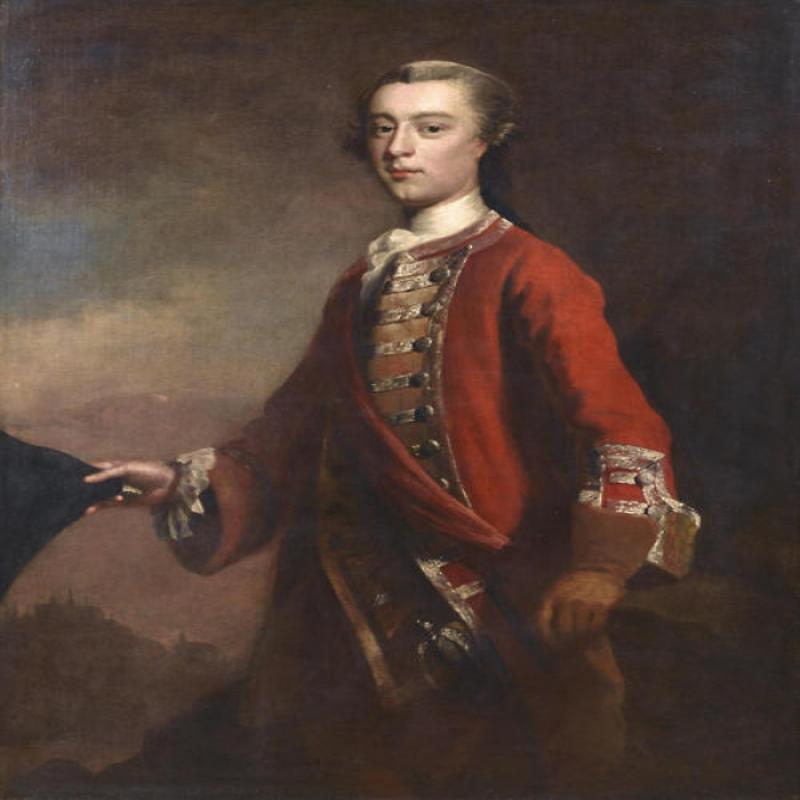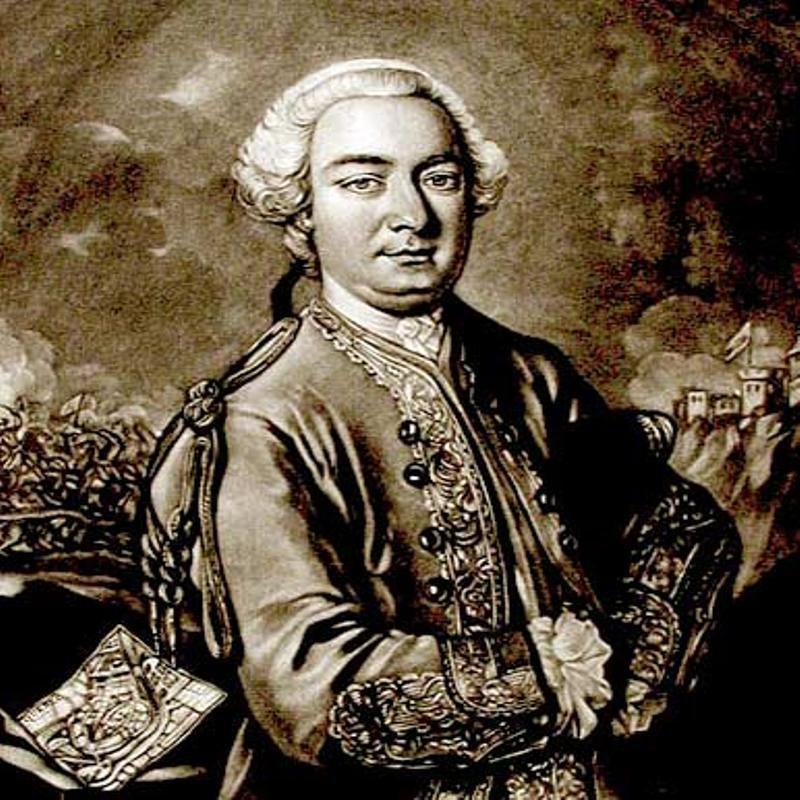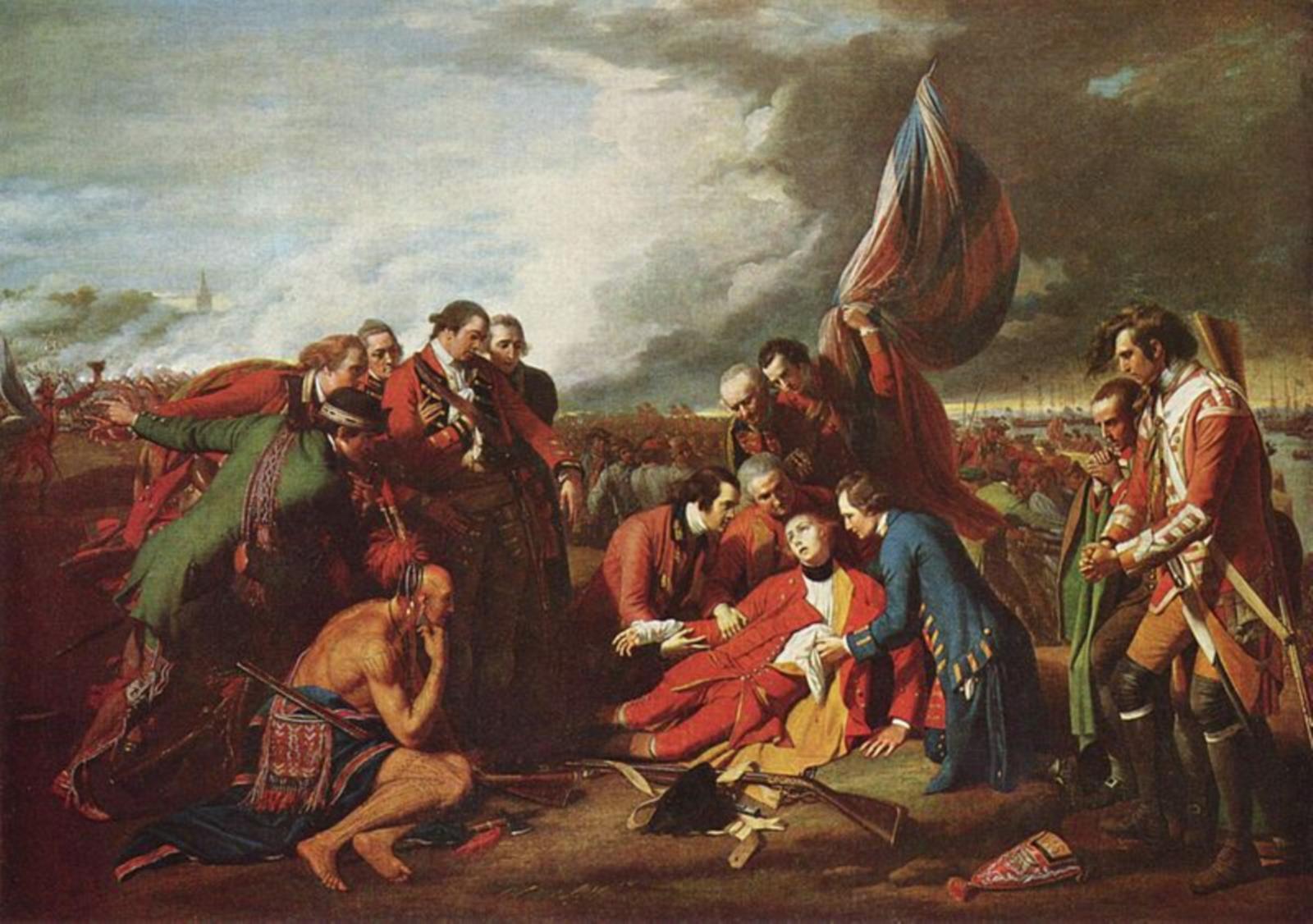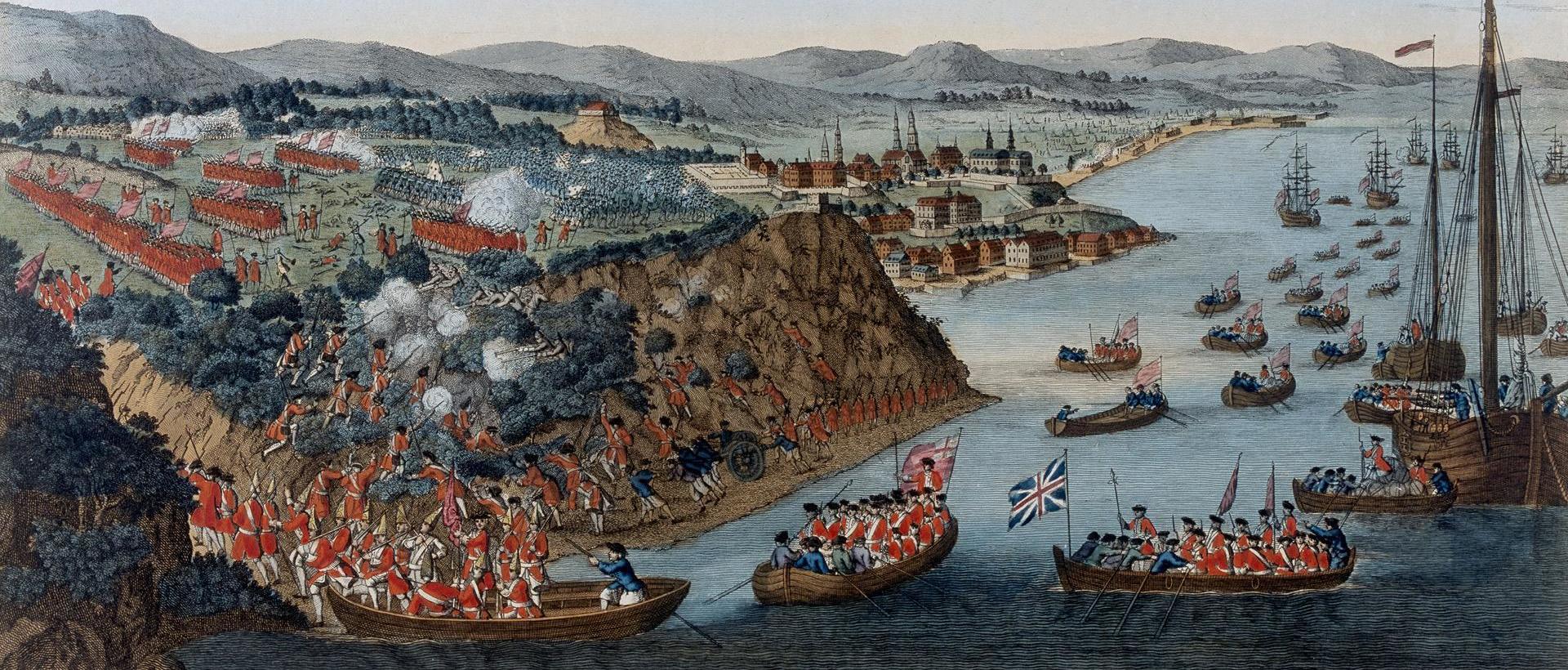General Wolfe: The Heights of Abraham
Posted on 28th April 2021
General James Wolfe cemented his place in the Pantheon of British military heroes with his audacious defeat of the French forces at Quebec and with it the eventual capture of Canada itself. It was a victory that brought him the glory he so desperately sought but it was a glory for which he was to pay the ultimate price.
James Peter Wolfe was born in Westerham, Kent on 2 January 1727 and with his father Edward a Colonel in the Marines a military career was always going to be his son’s chosen path. Indeed, he enlisted in his father's Regiment when aged only thirteen and from the outset was to prove himself an assiduous student of military tactics and to be very ambitious with his rapid rise through the ranks more earned than it was down to family connections. Within a year and still aged only 14 he was commissioned 2nd Lieutenant and in command of men.

He served during the War of the Austrian Succession and it was at the Battle of Dettingen on 27 June 1743, that he first came to the attention of King George II's youngest son William Augustus, the Duke of Cumberland who was so impressed that he promoted him to Captain. The following year he was sent him to Scotland where there existed the threat of Jacobite Rebellion.
As Aide-de-Camp to the brutal and obtuse Henry Hawley he did his utmost to advise the old General on how best to combat the Jacobites but was ignored. The old General as brave but complacent and inept as ever blundered his way to defeat at the Battle of Falkirk but none of the blame rubbed off on the young Wolfe who while Hawley was replaced found himself promoted to lead a Regiment of the line.
In April 1746, Wolfe’s Regiment was involved in some of the fiercest fighting at the decisive Battle of Culloden where he earned praise for his qualities of leadership but when in the presence of the Duke of Cumberland, he was ordered to execute a Highlander he refused saying: "My honour is worth more than my Commission”. It was an act of mercy, but it should not be confused with sympathy for the Highlander or his cause. He regularly referred to the Scots as savages though his opinion of them moderated somewhat when he was given command of a Regiment of Scots Fusiliers. Wolfe was to remain in Scotland for six years before returning to England where still only 23 years of age in 1750 he was promoted to the rank of Lieutenant-Colonel.
In 1754 the Seven Years War so-called, though it was in fact to last 9 years began and despite the fighting mostly taking place on the European Continent where most of the major powers were engaged British involvement occurred mainly in their colonies overseas and against their old enemy France - for Britain it was not a war of dynastic succession but one of conquest and the forging of an Empire.
When Britain did involve itself in the conflict in Europe it often ended badly. For example, they had intended to take the French port city of Rochefort and Wolfe, who was present had advanced a series of audacious stratagems fo storming the city all of which had been rejected. As such, he was often in dispute with his superiors but the fact that he opposed the strategy adopted and could not be blamed for the chaotic operational disaster that ensued only served to enhance his reputation further.

James Wolfe was described at this time as being a bundle of nervous energy full of ideas and always eager to voice an opinion who despite being somewhat of a hypochondriac always ill with some malady or other seemed to be everywhere all the time. Indeed, his enthusiasm appeared to energise those around him. He was exacting in everything he did, disciplined and hard-working, and he expected the same standards from his Officers and men. His hyperactivity was noticed and when it was described to the King as madness he responded: "Mad is he, then I wish he would infect some of my other Generals."
In his short career so far, James Wolfe had managed to impress everyone, so much so that the Prime Minister William Pitt the Elder promoted him to Brigadier-General and appointed him Second-in-Command to Sir William Amherst in Canada. His task would be to eject the French from Canada and make it British. He was on the fast-track to glory.
Having distinguished himself at the Siege of Louisbourg, Pitt, whose admiration for Wolfe seemed unbounded, now put him in charge of the campaign to take the greatest of all the French-Canadian cities, Quebec. Wolfe was determined not to fail but he was aware of the difficulty of the task. If he could not take the city, then he would make its continued occupation untenable. He wrote to Amherst: "I propose to set the town on fire with shells, to destroy the harvests and cattle, and leave desolation and famine behind me."
Wolfe was to be stuck outside the walls of Quebec for months. A full-frontal assault on the city had failed disastrously and as time passed it was the British position not the French that was becoming increasingly desperate.

The French Commander at Quebec was the Marquis Louis-Joseph de Montcalm, an able and experienced soldier who had taken charge of French forces in North America in 1756 following the capture of his predecessor. He had proven a great success capturing several forts before defeating a much larger British force at the Battle of Carillon in July 1758.
His reputation as a man of honour had been damaged however, by the massacre of British prisoners taken following the surrender of Fort William Henry including women and children by his Algonquin Indian allies. They had negotiated their surrender of the fort on the promise of safe conduct and Montcalm had given his word that they would not be harmed but he had been unable to provide them with the protection he said he would, and though he personally did his best to halt the attacks the same cannot be said of many of his Officers .
An aristocrat to his very core it hurt him deeply to have his honour impugned and it has been suggested that he curtailed his advance on the now vulnerable Fort Edward from a feeling of shame and disgrace.
Wolfe knew that he could not storm the city and so had to lure the French out from behind their fortifications and give battle in the open; he ordered those farms in the area surrounding the city attacked and burned still but Montcalm would not be drawn.
He had earlier been advised to approach the city from the north and cut-off Montcalm's supply line to Montreal. This he had done but he also knew it would take months to have any real effect, and it was time he did not have. He responded by attempting to storm Montcalm’s riverside fortifications but again the attack was repulsed with heavy loss of life. An alternative would have to be found.
What he came up with was a plan of such breath-taking audacity that all of his senior Officers advised him against adopting it. He would take 4,000 men down the St Lawrence River in the dead of night and disembark them at a small cove. They would then scale the 170-foot sheer cliff face of the Heights of Abraham emerging on the plains above and before the walls of the city. Montcalm, with some justification thought the Heights an insurmountable barrier and had left them virtually undefended.
Wolfe’s preparations had been thorough and had every confidence in his army, he had trained them well and many of them were veteran soldiers, but he nonetheless had his doubts. Waiting for a night when the light of the moon would be shrouded by cloud on 12 September he wrote:
“I had the honour to inform you today that it is my duty to attack the French Army. To the best of my knowledge and ability, I have fixed upon that spot where we can act with most force and are most likely to succeed. If I am mistaken I am sorry for it and must be answerable to His Majesty and the public for the consequences”.
It would be his last letter for that night the assault on the Heights of Abraham began.
His men would need all their attributes of courage, discipline and patience as total surprise was necessary for the plan to succeed. If they were caught on the river or discovered whilst scaling the Heights then a massacre would ensue especially as a substantial French force under Colonel de Bougainville lay to their west exposing them to a flank attack.

Before they set off the oars of the boats were muffled and the order was given forbidding anyone to speak. Reports of boats being seen on the river reached Montcalm but he dismissed them as a shipment of supplies he had been expecting to arrive from sea.
Wolfe had also been aware of the French intention to sail ships down the St Lawrence River and it provided perfect cover. He now ordered a feint attack to be launched on the east of the city to draw French troops away from the intended landing zone.
Once at the Heights the troops were ordered to remove their boots before they started the climb. They were challenged only once by a sentry who was answered by an English Officer in perfect French, and they were allowed to pass unhindered.
As dawn broke on the morning of 13 September, Montcalm was astonished to see a British army formed up in two lines before the city walls. Wolfe was in a precarious position unable to call upon reinforcements and with the cliffs behind him no possibility of retreat. But Montcalm, perhaps believing the British had artillery which was not the case or seeing it as an opportunity to restore his tarnished reputation now acted in haste. He ordered his troops to vacate their entrenchments and form up for an assault, but they were ill-prepared and a third of them were untrained militia and Indians who had no idea how to fight in formation. Wolfe in the meantime had ordered his troops to lie low to avoid the fire from skirmishers and to double-load.
As the French advanced they stopped to fire but their shot fell short and the militia soon broke ranks to charge the British lines. The British rose up to meet them but held their fire until the enemy were within 35 yards when the ground shook from the force of 4,000 muskets all firing at once.
The scene was shrouded in smoke as the British re-loaded and fired for a second time upon a now unseen enemy. As the smoke of the gunfire began to clear the French could be seen fleeing the field. Wolfe ordered a bayonet charge but as he advanced with his men, he was shot first in the hand, then in the arm, and finally twice in the chest. He fell to the ground mortally wounded. When he heard an Officer say "they run", he asked "who runs?" The Officer replied – the French.

Upon hearing these words, he issued further orders before he turned onto his side and died, he was 32 years of age.
The Marquis de Montcalm who had bravely led his men into battle on horseback and was desperately trying to rally them was also shot down and carried from the field. He was to die the following day despairing of his troops failure to obey his orders and of running at the first whiff of powder.
The Governor of Quebec, the Marquis de Vaudreuil-Cavagnial was quick to blame Montcalm for the defeat and six days later ordered the city abandoned.
The Battle of the Plains of Abraham had lasted barely fifteen minutes during which the British had suffered some 200 casualties the French 600, but its significance far outweighed its duration. There was still much hard fighting to be done but the capture of Quebec provided Britain with a vital foothold in Canada reinforced by the later surrender of Montreal and the defeat of the French Fleet at Quiberon Bay.
Three years after Wolfe’s remarkable victory at Quebec the French signed the Treaty of Paris ceding their territories on the North American Continent and what had been New France became British Canada.
In death James Wolfe became a hero and a martyr and it was later suggested that he had deliberately courted death to enable him to become so then he ensured his martyrdom would be etched in marble and be honoured in Westminster Abbey.
Share this post:





